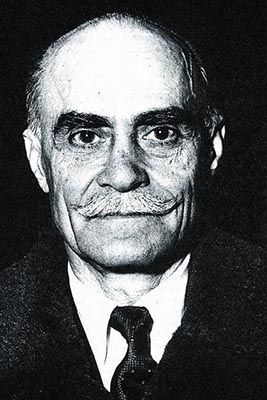Also known as:
Νικόλαος Πλαστήρας
More People of Greece
More Topic Categories
Related Destinations
Nikolaos Plastiras (04/11/1883 - 26/07/1953)
 Nikolaos Plastiras was a Greek army official and politician. He was known for his military activities during the Balkan Wars and the Greco – Turkish War of 1919.
Nikolaos Plastiras was a Greek army official and politician. He was known for his military activities during the Balkan Wars and the Greco – Turkish War of 1919.He was born in a town near Karditsa in 1883. After completing his secondary studies, he volunteered at the army in 1903, and participated in the Macedonian Struggle. He actively participated at the “Military Link”, which brought Eleftherios Venizelos to power. In 1912, after his graduation from the Military School in Corfu, he participated in the Balkan Wars and was distinguished for his valor; his fellow soldiers nicknamed him “the Black Rider”. During the National Schism of 1916, he supported Venizelos and participated in the National Defense Movement. In 1919, he commanded troops in Ukraine, supporting the Russian “White Army” against Lenin.
Later, he was sent to Asia Minor, during the Greco – Turkish War of 1919, where his reputation grew even stronger; the Turks named him “Black Pepper” (because of his dark skin), and his units “Satan’s Army”. He then went to Chios with his army, saving many refugees from Asia Minor. The Disaster in Asia Minor in 1922 caused the uprising of the army in Chios and the creation of a “Revolutionary Committee” under the command of Plastiras, Gonatas and Fokas. The Committee demanded the dethronement of King Constantine and the resignation of the Gounaris government. Constantine resigned in order to place his son George II on the throne, and Krokidas became the new Prime Minister.
Plastiras brought Venizelos back from exile, in order to be the main negotiator of the terms with Turkey, which were settled during the Treaty of Lausanne (1923). The Revolutionary Committee successfully quenched the pro – royalty coup of Gargalidis and Leonardopoulos. Believing that a soldier’s role is in a bunker and not in a place of power, Plastiras declared that elections would be held in December 1923. The new government paved the way to the Second Greek Republic; on that same day, Plastiras resigned from the army.
Until 1933, Plastiras did not participate in politics and lived between Greece and Italy. Then, the anti – Venizelist party “United Opposition” won the elections and Plastiras tried to organize a coup that failed miserably, as he was not even supported by Venizelos. In the danger of being called treasonous, he went via the Dodecanese to Beirut and finally France. Although he was not prosecuted for the coup of 1933, he was sentenced to death with Venizelos in absentia for the revolutionary movement of 1935.
After the liberation by the Germans, he became Prime Minister in 1945 as a widely accepted figure. During the Civil War he did not participate in politics, but instead criticized both the Left and the Right Wing for their vile contributions to the schism. After the end of the Civil War, in 1951, he became prime minister forming a coalition government. During the elections of 1952, he lost; he died shortly after, having suffered from many heart attacks and strokes in the previous years.
See Also:
 Athens Photos
Athens Photos
 Santorini Photos
Santorini Photos
 Crete Photos
Crete Photos
 Meteora Photos
Meteora Photos
 Corfu Photos
Corfu Photos





